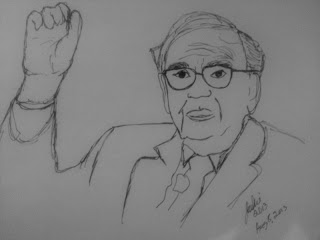 |
| In Deal Hunt, Big-Game Buffet Settles for Small Prey |
Winston dialed "back numbers" on the telescreen and called for appropriate issues of the Times, which slid out of the pneumatic tube after only a few minutes' delay. The messages he had received referred to articles or news items which for one reason or another it was thought necessary to alter, or, as the official phrase had it, to rectify. For example, it appeared from the Times of the seventeenth of March that Big Brother, in his speech of the previous day, had predicted that the South Indian front would remain quiet but that a Eurasian offensive would shortly be launched in North Africa. As it happened, the Eurasian Higher Command had launched its offensive in South India and left North Africa alone. It was therefore necessary to rewrite a paragraph of Big Brother's speech in such a way as to make him predict the thing that had actually happened. Or again, the Times of the nineteeth of December had published the official forecasts of the output of various classes of consumption goods in the fourth quarter of 1983, which was also the sixth quarter of the Ninth Three-Year Plan. Today's issue contained a statement of the actual output, from which it appeared that the forecasts were in every instance grossly wrong. Winston's job was to rectify the original figures by making them agree with the later ones. As for the third message, it referred to a very simple error which could be set right in a couple of minutes. As short a time ago as February, the Ministry of Plenty had issued a promise (a "categorical privilege" were the official words) that there would be no reduction of the chocolate ration was to be reduced from thirty grams to twenty at the end of the present week. All that was needed was to substitute for the original promise a warning that it would probably be necessary to reduce the ration at some time in April.
Warrn Buffet hasn't fired his "elephant gun" much recently, but he has put his managers on the hunt for smaller prey.
As soon as Winston had dealt with each of the messages, he clipped his speakwritten corrections to the appropriate copy of the Times and pushed them into the pneumatic tube. The, with a movement which was as nearly as possible unconscious, he crumpled up the original message and any notes that he himself had made, and dropped them into the memory hole to be devoured by the flames.
Berkshire Hathaway Inc.'s BRKB +0.72% subsidiary operations collectively spent about $2.3 billion on 26 acquisitions last year, which the company says is a record amount. They have continued that streak this year, acquiring more than a dozen companies in the first half of 2013. Berkshire hasn't disclosed the amount spent by its subsidiaries on acquisitions this year.
What happened in the unseen labyrinth to which the pneumatic tubes led, he did not know in detail, but he did know in general terms. As soon as all the corrections which happened to be necessary in any particular number of the Times had been assembled and collated, that number would be reprinted, the original copy destroyed, and the corrected copy placed on the files in its stead. This process of continuous alteration was applied not only to newspapers, but to books, periodicals, pamphlets, posters, leaflets, films, sound tracks, cartoons, photographs----to conceivably hold any political or ideological significance. Day by day and almost minute by minute the past was brought up to date. In this way every prediction made by the Party could be shown by documentary evidence to have been correct; nor was any item of news, or any expression of opinion, which conflicted with the needs of the moment, ever allowed to remain on record. All history was a palimpsest, scraped clean and reinscribed exactly as often as was necessary. In no case would it have been possible, once the deed was done, to prove that any falsification had taken place. The largest section of the Records Department, far larger than the one in which Winston worked, consisted simply of persons whose duty it was to track down and collect all copies of books, newspapers, and other documents which had been superseded and were due for destruction. A number of the Times which might, because of changes in political alignment, or mistaken prophecies uttered by Big Brother, have been rewritten a dozen times still stood on the files bearing its original date, and no other copy existed to contradict it. Books, also, were recalled and rewritten again and again, and were invariably reissued without any admission that any alteration had been made. Even the written instructions which Winston received, and which he invariably got rid of as soon as he had dealt with them, never stated or implied that an act of forgery was to be committed; always the reference was to slips, errors, misprints, or misquotations which it was necessary to put right in the interests of accuracy.
With bigger, multibillion-dollar deals few and far between of late, Mr. Buffett increasingly favors such "bolt-on" acquisitions because they increase Berkshire's earnings and enable it to use its cash pile, which stood at $36 billion at the end of June. Net cash flow from operations rose nearly 36% for the first six months of 2013 from a year earlier, putting greater pressure on Berkshire to use its cash rather than hoard it.





























